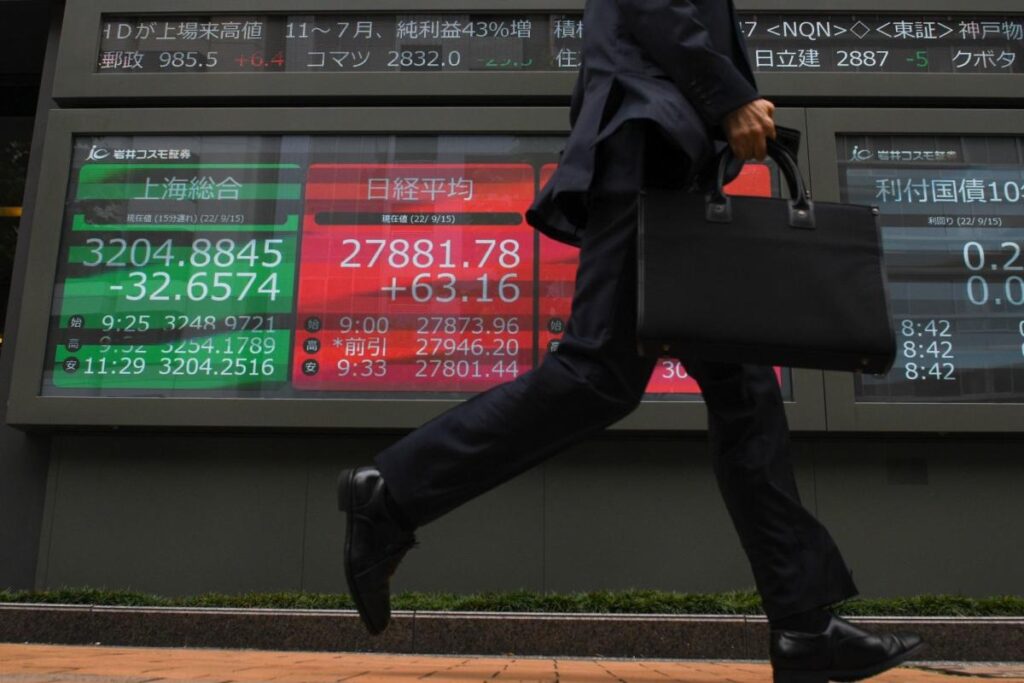(Bloomberg) — Short-end Treasury yields rose for a second day and US equity futures were steady as concerns over the American banking sector eased, while rising inflation supported bets for further Federal Reserve rate hikes.
Most Read from Bloomberg
The two-year Treasury yield — the most sensitive to policy moves — climbed 11 basis points to 4.36%, adding to Tuesday’s 27-point rise, while the 10-year rate was little changed at 3.69%. Contracts on the S&P 500 and Nasdaq 100 fluctuated between small gains and losses. A gauge of dollar strength edged higher after four days of declines.
Swaps pricing is back to positioning for the Fed to lift rates by a quarter percentage point next week after the odds of an increase had slipped to nearly 50-50 on Monday. The closely-watched core consumer price index increased 0.5% in February, slightly ahead of the median estimate of 0.4% and enough to keep pressure on policy makers.
“Our view is inflation has peaked and the Fed will do one more rate hike of 25 basis points and that’s it,” Mark Matthews, Asia research head at Bank Julius Baer & Co., said on Bloomberg TV.
Europe’s Stoxx 500 equity benchmark slipped about 0.4%, with energy companies among the biggest decliners after this week’s steep drop in oil prices. Bonds across Europe fell, with the German two-year yield rising 12 basis points to breach 3%
Traders were also digesting a slew of economic data from China, where retail sales rose as much as estimated while factory output was fractionally lower than projected. The People’s Bank of China added more liquidity than expected while holding a key lending rate unchanged. Rising housing sales provided one clearly positive signal, reflected in a rally in a mainland property index.
Financials were among the biggest gainers Wednesday in Tokyo and Hong Kong, where the Hang Seng Index rose more than 1%. US stocks rallied into the close Tuesday, helping set the scene for the shift in sentiment in Asia.
Remarks from ratings companies on the financial sector underscored that sentiment is likely to remain fragile after the biggest American bank failures since the financial crisis.
Moody’s Investors Service cut its outlook on the sector on the heels of the trio of banking collapses over the past few days. First Republic Bank triggered a volatility halt after S&P Global Ratings placed the company on watch negative.
Elsewhere in markets, oil rose from its lowest close in three months as traders took stock of the outlook for demand. Gold held a drop that took some of the shine off a three-day surge of more than 5%.
Key events this week:
-
Eurozone industrial production, Wednesday
-
US business inventories, retail sales, PPI, empire manufacturing, Wednesday
-
Eurozone rate decision, Thursday
-
US housing starts, initial jobless claims, Thursday
-
Janet Yellen appears before the Senate Finance Committee, Thursday
-
US University of Michigan consumer sentiment, industrial production, Conference Board leading index, Friday
Some of the main moves in markets:
Stocks
-
The Stoxx Europe 600 fell 0.5% as of 8:08 a.m. London time
-
S&P 500 futures fell 0.1%
-
Nasdaq 100 futures were little changed
-
Futures on the Dow Jones Industrial Average fell 0.2%
-
The MSCI Asia Pacific Index rose 0.6%
-
The MSCI Emerging Markets Index rose 0.8%
Currencies
-
The Bloomberg Dollar Spot Index rose 0.2%
-
The euro was unchanged at $1.0733
-
The Japanese yen fell 0.5% to 134.94 per dollar
-
The offshore yuan fell 0.2% to 6.8966 per dollar
-
The British pound was little changed at $1.2150
Cryptocurrencies
-
Bitcoin rose 1.3% to $24,960.28
-
Ether rose 0.2% to $1,708.7
Bonds
-
The yield on 10-year Treasuries was little changed at 3.69%
-
Germany’s 10-year yield advanced eight basis points to 2.50%
-
Britain’s 10-year yield advanced six basis points to 3.55%
Commodities
-
Brent crude rose 1.3% to $78.47 a barrel
-
Spot gold fell 0.7% to $1,890.42 an ounce
This story was produced with the assistance of Bloomberg Automation.
–With assistance from Tassia Sipahutar.
Most Read from Bloomberg Businessweek
©2023 Bloomberg L.P.


